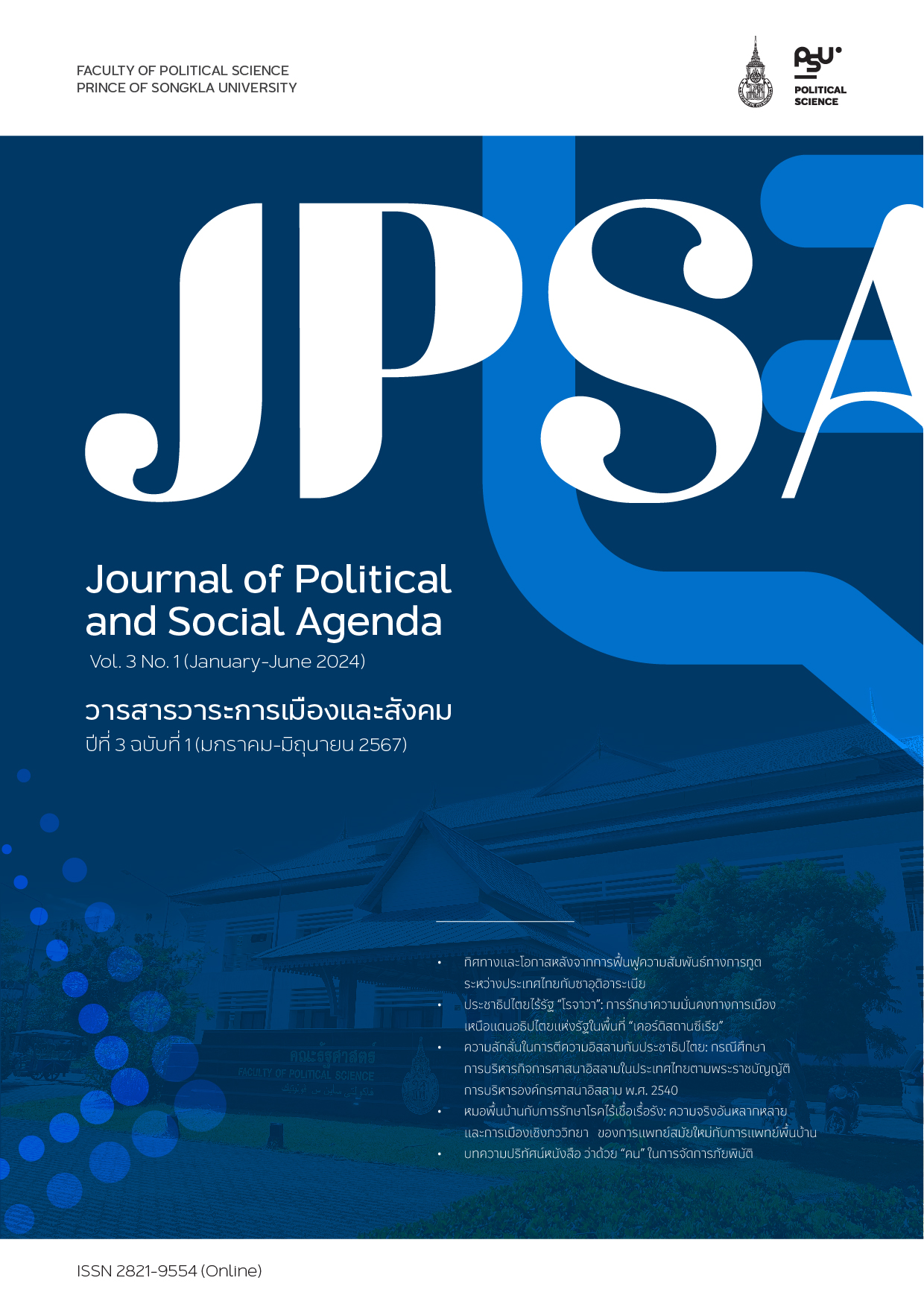ความลักลั่นในการตีความอิสลามกับประชาธิปไตย กรณีศึกษาการบริหารกิจการศาสนาอิสลามในประเทศไทยตามพระราชบัญญัติการบริหารองค์กรศาสนาอิสลาม พ.ศ. 2540
Main Article Content
บทคัดย่อ
มุสลิมไทยต้องเผชิญกับคุณค่าใหม่ๆที่มาพร้อมกับกระบวนการประชาธิปไตย และจำเป็นต้องให้ความหมาย อธิบาย ตีความคุณค่าเหล่านั้นอ้างอิงกับหลักความเชื่อในศาสนาอิสลาม หลักการการได้มาซึ่งผู้นำด้วยวิธีการเลือกตั้งในระบอบประชาธิปไตย เป็นหลักการที่ถกเถียงกันมากที่สุดเมื่อนำมาใช้กับการเลือกผู้นำองค์กรบริหารกิจการอิสลามในประเทศไทย โดยผลของการถกเถียงนี้ปรากฎออกมาผ่านพระราชบัญญัติการบริหารองค์กรศาสนาอิสลาม พ.ศ. 2540 ซึ่งเป็นการผสมผสานระหว่างการเลือกตั้งแบบประชาธิปไตยและหลักการเลือกผู้นำที่ได้รับการอธิบายว่ามาจากหลักการอิสลาม พรบ.การบริหารฯ กำหนดให้เฉพาะอิหม่ามเป็นผู้มีสิทธิ์เลือกกรรมการอิสลามประจำจังหวัด (กอจ.) ซึ่งมีวาระ 6 ปี การกำหนดให้เฉพาะอิหม่ามเป็นผู้มีสิทธิ์เลือกตั้งนั้นได้รับการอธิบายว่าสิทธิ์ดังกล่าวผูกติดกับความรู้ทางศาสนา การตีความลักษณะนี้ทำให้อิหม่ามผูกขาดการเป็นผู้มีสิทธิเลือกกอจ. แต่เพียงผู้เดียวตลอดชีวิต ความลักลั่นและความไม่ลงรอยนี้เกิดขึ้นในระดับกรรมการกลางอิสลามแห่งประเทศไทย (กอท.) และรวมถึงตำแหน่งจุฬาราชมนตรีด้วย บทความนี้จึงต้องการชี้ให้เห็นถึงความลักลั่นดังกล่าว รวมถึงแสดงให้เห็นถึงผลเสียของการตีความอิสลามและประชาธิปไตยในลักษณะนั้น ในตอนท้ายบทความได้ชี้ให้เห็นถึงการตีความแบบอื่นที่เหมาะกับสภาพสังคมสมัยใหม่แต่ยังคงรักษาหลักการและจิตวิญญาณของอิสลาม อีกทั้งยังเสนอแนวคิดองค์กรบริหารกิจการอิสลามในอนาคต
Article Details

อนุญาตภายใต้เงื่อนไข Creative Commons Attribution-NonCommercial-NoDerivatives 4.0 International License.
บทความที่ได้รับการตีพิมพ์ในวารสารออนไลน์เล่มนี้เป็นลิขสิทธิ์ของวารสารวาระการเมืองและสังคม ความคิดเห็นและข้อถกเถียงที่ปรากฏในบทความเป็นความรับผิดชอบของผู้เขียน บรรณาธิการวารสารฯ ไม่มีความเกี่ยวข้องใด ๆ กับความคิดเห็นของผู้เขียนและไม่จำเป็นต้องเห็นด้วยกับความคิดเห็นของผู้เขียน
เอกสารอ้างอิง
ภาษาไทย
คณะกรรมการกลางอิสลามแห่งประเทศไทย. (2560). รวมกฎหมาย กฎกระทรวง ระเบียบ ข้อบังคับและ ประกาศเกี่ยวกับ การบริหารองค์กรศาสนาอิสลามในประเทศไทย. กรุงเทพฯ: ม.ป.พ.
ดอน ปาทาน และคณะ. (2561). สัญญาณความหวาดกลัวอิสลามในสังคมไทย. กรุงเทพฯ: ปาตานีฟอรั่ม.
พัชรี สิโรรส. (2561). หลักธรรมาภิบาล: จากแนวคิดสู่การปฏิบัติในสังคมไทย. กรุงเทพฯ: สถาบันพระปกเกล้า. พระราชบัญญัติการบริหารองค์กรศาสนาอิสลาม พุทธศักราช 2540 http://web.krisdika.go.th/data/law/law2/%a188/%a188-20-2540-001.pdf
ภาษาอังกฤษ
Friedrich Nietzsche. (1996). On the Genealogy of Morals. Douglas Smith (trans.). Oxford: New York. Oxford University Press.
Muhammad Ilyas Yahprung. (2016). Rising Enmity between the Buddhist and Muslim inThailand: A Preliminary Assessment. In International Seminar on Islam and Global Peace (ISGaP 2016): pp.22-27. Bangi: Universiti Kebangsaan Malaysia.
Ibrahim, A. (2014). Contemporary Islamic Discourse in the Malay-Indonesian World: Critical Perspective. Selangor: SIRD.
Mohammad Hashim Kamali. (2015). The Middle Path of Moderation in Islam: The Qur’anic Principle of Wasatiyyahh. Kuala Lumpur: Oxford University Press.
Bayat, A. (2007). Making Islam Democratic: Social Movement and the Post-Islamist Turn. California: Standford University Press.
El-Affendi, A. (2008). Who needs An Islamic State?. Kuala Lumpur: Malaysia Think Tank London.
Zaman, Muhammad Quasim. (2002). The ‘Ulamā’ in contemporary Islam: custodians of change. Princeton and Oxford: Princeton University Press.
Imtiyaz Yusuf (1998). Islam and Democracy in Thailand: Reforming the Office of Chularajmontri/Shaikh Al-Islam. Journal of Islamic Studies 9(2). pp.277-298.


